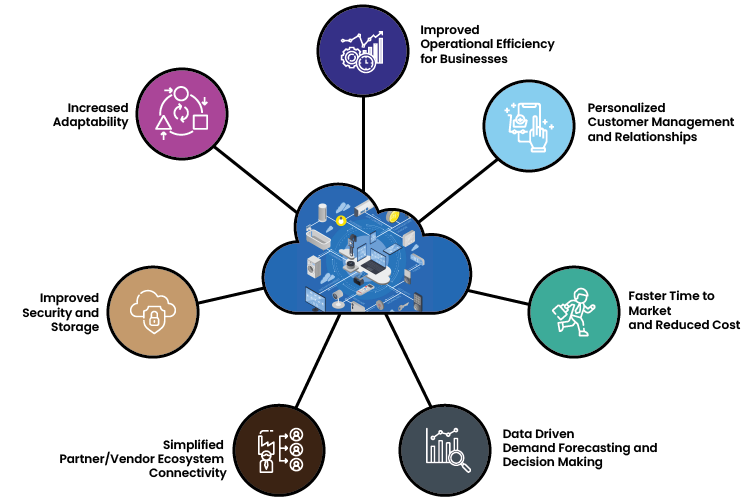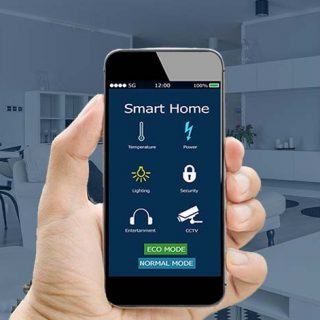With the upcoming technologies, economic instability and increasing regulation applying pressure on the consumer electronics industry, companies will face more complex supply chains, shrinking product life cycles, uncertain demand and decreasing revenues. Within this dynamic scenario, cloud computing offers a new path for sustainable, efficient and flexible growth. According to Gartner, Inc.’s latest report, global spending by end-users on public cloud services is anticipated to rise by 21.7% to reach $597.3 billion in 2023. Gartner also foresees that by 2026, around 75% of organizations will adopt a digital transformation approach centered on the cloud as the fundamental foundational platform.
For the electronics industry, cloud computing services offer the potential to redefine customer relationships management, improve governance and transparency, transform operations and expand business agility. Let us see how the cloud can stimulate benefits for the consumer electronics industry.
Benefits of Cloud for the Consumer Electronics Industry
Cloud technology offers significant advantages to the consumer electronics industry. Following are a few ways in which cloud computing is changing the consumer electronics industry.
Improved Operational Efficiency for Businesses
The development of cloud computing, web services and service oriented architecture, is the key to providing the integration that will open up the field to improved collaboration and operational efficiency.Cloud computing service providers allow companies (big or small) to move a part or all of their operations from a local network to the cloud platform, thereby making it easier for them to access a host of facilities such as data storage, processing, and much more.To illustrate, managing content deployment and OTA for 70K+ on-field connected devices for a leading electronics manufacturer of touch screen displays and POS devices would not have been easy without Cloud device management Software-as-a-Service. Cloud based portal enabled their user subscription management, content upload, add/update devices and configurations all on a single portal within a click, thus, simplifying processes and improving operational efficiency with anytime anywhere access. Also, a standard transition of business applications to cloud is seen where organizations deploy SAP/ CRM on the cloud providing flexible accessibility and simplified setup for servers/software.
Personalized Customer Management and Relationships
In addition to bringing buyers and sellers together on online marketplace, consumer electronics companies can add value by generating personalized product recommendations for buyers with the help of cloud computing and analytics. Because of the cloud’s expanded computing power and capacity, it can store information about user preferences, its location and run algorithms to derive intelligent insights enabling product or service customization. For example, a leading consumer electronics brand inferred their user preferences from buying behavior and usage patterns and used that analytics to offer customized advertisements, offers and suggestions. Ultimately, this paradigm facilitates a host of possibilities, from radically improving the performance of current devices and services that benefits the companies, to delivering improved customer satisfaction ensuring customer loyalty.

Enabled Businesses with Faster Time to Market and Reduced Cost
Competitive advantage created by going to market first with innovative new products, be it feature-rich or value-driven is critically important in the electronics industry. Electronics OEMs have made dramatic reductions in the product development cycle time with product life cycle management (PLM) systems, but the development process still remains inefficient and time consuming. Multiple ready to use development and managed services like AWS IoT core, EC2, API gateway, Cognito, S3, Azure Blob Storage, Virtual Machines and many more from leading cloud providers helps expedite collaborative product development by reducing developer’s work. With cloud, companies can enforce standardized protocols, synchronize information between systems and access a centralized database provided by infrastructure-as-a-service. With automation and standardization, OEMs can improve development efficiency and avoid costly downstream errors. This helps to speed time to market and time to value, which in turn yields a critical competitive advantage.
Also, organizations adapting to serverless cloud architecture, on-demand database connectivity and pay as you go model enables to shift their IT capital cost to an operational or variable cost.
Simplified Partner/Vendor Ecosystem Connectivity
One of the major business enablers powered by cloud is ecosystem connectivity. Cloud facilitates collaboration with value chain partners and customers, which can lead to improvements in productivity and increased innovation. Cloud-based platforms can bring together disparate groups of people who can collaborate and share resources, information and processes. The recent trend of “open innovation” is powered via cloud-based software solutions that connect parties (companies, partners, distributors) and facilitate the sharing of ideas. There are also cloud based deal management platforms streamlining the presentation, negotiation, invoicing, and reconciliation of trade promotions received from company’s vendors, distributors in a secure, cloud environment. This put an end to the numerous emails, faxes and spreadsheets that are typically exchanged, reducing errors that are often associated with this kind of communication.
Data Driven Demand Forecasting and Decision Making
Efficient management of inventory is one of the common challenges faced in the Consumer Electronics industry. It is difficult for giant consumer electronics that manufacture multiple products and manage large distribution channels at different locations to check or manage their stock in real-time and predict future demands. With cloud computing and data analytics, they can have wide visibility of their stocks, market, consumer preferences and competition at global level. Cloud offers access to real-time data, cloud architecture and analytics platforms to build both predictive and prescriptive inventory forecasting that significantly decreases their issues such as stocks shortage or surplus, enabling better decision making and managed inventories. Moreover, company executives can access data and stocks at any time and from anywhere to check the real-time stock availability.
Improved Security and Storage
Cloud computing providers are now highly concerned about their users’ data security and sensitive data storing. User data is made safer by avoiding storage on a single device and by using encrypted passwords and restricted access. The cloud system also adds extra protection with firewalls and anti-malware software. Additionally, businesses can swiftly access and share data due to high-quality hardware used by cloud providers. From this, businesses benefit from swift data access and sharing through top-notch hardware, elevating operational speed and efficiency.
Increased Adaptability
In the consumer electronics industry, cloud computing greatly enhances adaptability by facilitating rapid innovation and responsiveness. Manufacturers and developers can leverage cloud resources to quickly prototype and test new products and features, reducing time-to-market. The scalability of cloud infrastructure allows companies to manage variable demand during product launches or seasonal peaks without overinvesting in on-premises hardware. Additionally, cloud-based software updates enable seamless improvements to device functionality, addressing user needs and security concerns in real-time.
Industries that can directly benefit from cloud computing solutions
The cloud has evolved beyond a one-size-fits-all solution, impacting diverse industries and organizations of all sizes. VOLANSYS’ cloud services offer a game-changing opportunity that serves unique needs and desires.
Healthcare: Historically, healthcare took time to adopt new tech due to security and transition concerns. Our Cloud Healthcare solution ensures seamless and secure integration, complying with regulations like HIPAA. Beyond this, it facilitates patient-doctor connectivity, enhances collaboration, and streamlines tasks for better patient care.
Automotive: Cloud computing brings transformative benefits to the automotive industry by enabling access to real-time data and resources. Whether tracking vehicle performance, managing inventories, or enhancing customer experiences, the cloud empowers automotive companies to streamline operations, optimize supply chains and leverage data-driven insights for innovation. With the cloud’s scalability and flexibility, automotive manufacturers and dealerships can efficiently manage complex processes, get quick info they need, and make deals faster.
Manufacturing: In manufacturing, companies manage multiple sites and complex supply chains. The cloud provides seamless connectivity, essential infrastructure for each location, and cost-effective solutions for significant production deployments. The cloud’s flexibility enables rapid deployment of new technologies and applications, facilitating innovation in areas such as predictive maintenance and process automation. With reduced IT infrastructure costs and improved resource allocation, manufacturers can enhance operational efficiency, respond swiftly to market demands, and maintain a competitive edge in the manufacturing industry.
Home Automation: Cloud computing revolutionizes the home automation industry by offering a seamless platform for connected devices. For instance, smart thermostats can access weather data from the cloud to adjust temperatures accordingly, while security cameras can store footage securely online. This centralization enables remote control and monitoring, ensuring homeowners can adjust settings and receive alerts even when away. The cloud’s scalability also means easy integration of new devices, such as voice-controlled assistants, creating a cohesive and adaptable smart home ecosystem that enhances convenience, energy efficiency, and overall quality of life.
To succeed with cloud, consumer electronics companies have to assess its impact on the operating model and determine successive actions for more effective cloud adoption. At VOLANSYS, we offer enterprise grade cloud computing services including architecture, development, deployment, migration, optimization of cloud solutions and cloud data analytics that helps consumer companies transform their business model and operations with enhanced flexibility, scalability and efficiency elevating their businesses to the next level. We also provide cloud consulting services that enable organizations to create an IT infrastructure that can support cloud computing.
About the Authors:

Dhruvesh Soni
Dhruvesh is associated with VOLANSYS Technologies as Principle Engineer over 6 years. He has diversified experience of developing solutions for domains like Cloud, Internet of Things (IoT), Industrial Internet of Things (IIoT) and more across multiple industries bringing in value to our clients solutions.

Prima Saraiya
Prima is associated with VOLANSYS as a Senior Marketing Executive with proven experience in digital marketing, lead generation, collateral development, content creation, brand promotions, partner relationships and events management.









